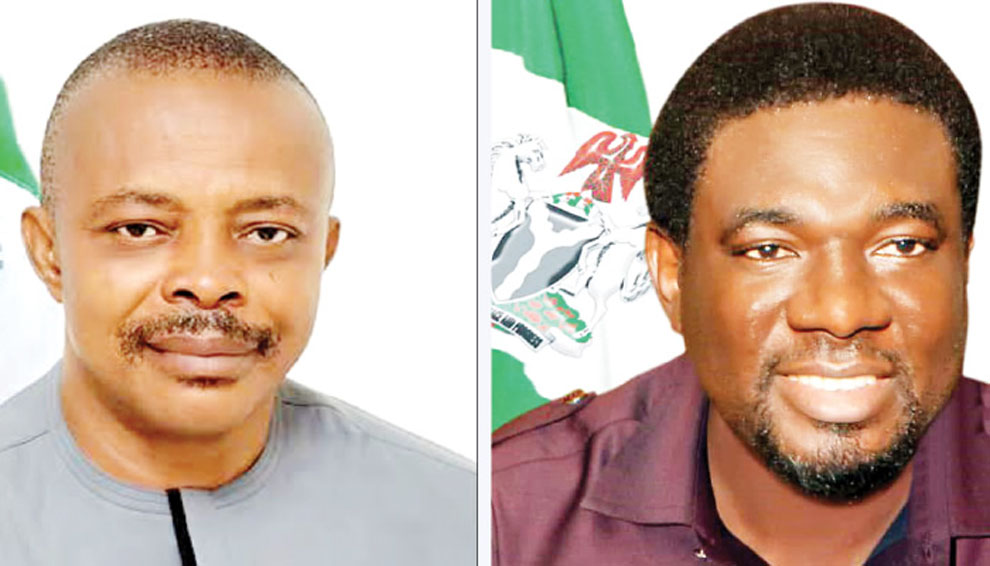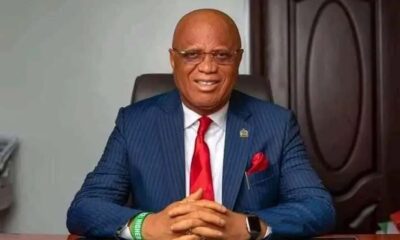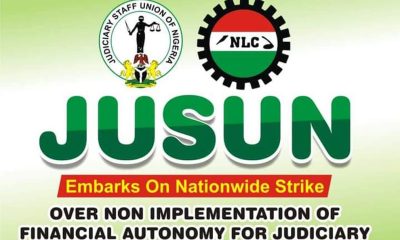News
Minimum wage: Labour reject govs individual negotiations, says workers salary not charity

Minimum wage: Labour reject govs individual negotiations, says workers salary not charity
The organised labour on Friday lambasted some state governors canvassing payments of minimum wage based on capacity of their respective states, saying the concept of a national minimum wage is not arbitrary.
Governors from the southern part of Nigeria, under the aegis of the Southern Governors’ Forum, had called for the consideration of the cost of living and the ability of each state to pay in reaching an agreement on the new minimum wage.
The governors, who disclosed their position at a meeting held at Abeokuta, Ogun State capital, also advocated that each state negotiate the new wage with the labour unions.
But reacting to the development, members of the organised labour comprising both the NLC and the TUC, explained that the governors’ notion was not only dictatorial but also undermined the essence and model adopted for creating a national minimum wage in Nigeria.
The organised labour, who spoke through the Head of Information at the NLC Headquarters, Benson Upah, said the governors’ argument appeared inconsistent when juxtaposed with the remuneration of political office holders.
According to him, there is no hue and cry when political office holders across the nation receive uniform salaries as determined by Revenue Mobilisation, Allocation and Fiscal Commission.
“This double standards which pits a few privileged against the majority poor is an issue that should be of concern to those who love this country.
“We are deeply concerned by this blatant display of ignorance regarding the global best practices for national minimum wage by some of these governors.
“It is evident that, despite their frequent travels abroad, they have deliberately chosen not to educate themselves on fundamental global issues crucial to successful governance.
READ ALSO:
- Trucks kills 14 Muslims returning from Jumat prayer in Kano
- Further thoughts on being sick and tired about Nigeria – Farooq Kperogi
- Appeal Court upholds Nollywood actor Baba Ijesha’s five-year jail term
“This level of self-imposed ignorance on basic industrial relations matters clearly illustrates why our nation is poorly governed, resulting in unacceptable suffering of Nigerians.
“For this set of governors, we recommend a return to school for proper education as they constitute a threat to our democracy,” Upah stated.
He said the pursuit by many governors to pay workers whatever they like deepened poverty and caused varying dimensions of insecurity.
The NLC spokesman maintained that the governors were carried away by their present structure of security detail but “the sword of Damocles awaits them on exit from office.”
Upah added, “It is unfortunate that workers’ salaries are often seen as charity rather than the hard-earned income of hardworking Nigerians.
“It is equally painful that some of these governors fail to realise that workers’ salaries substantially drive the economy. Not surprisingly, they prioritise their greed over the need of ordinary citizens.
“The fate of Nigerian workers cannot be left solely in the hands of employers, whether public or private. No sane society does that.
“What the governors are asking for is akin to allowing numerous companies and organizations in Nigeria to pay workers whatever they like.
“While these companies may not pay the same salaries, they must adhere to the national wage floor, and the same should apply to state governors.
“We urge President (Bola) Tinubu who had promised a living wage (which is superior to a minimum wage) not to allow himself be blackmailed or boxed into a corner by unpatriotic governors.
“We urge the federal government to stop dithering on the issue of the national minimum wage because of the gang-up by some selfish governors.”
The NLC spokesman called on the governors to abandon any inclination towards dictatorial practices, saying the process remained a tripartite one.
“Accordingly, we call for policies and actions driven by equity and fairness. Ensuring a fair minimum wage is not only a matter of economic justice but also a fundamental aspect of maintaining social stability and national cohesion.
“Nigerian workers should not be reduced to beggars! Enough is enough! Finally, NLC stands firm in its commitment to protecting the rights and welfare of Nigerian workers.
“We will continue to advocate for a fair and equitable wage system that reflects the true spirit of our nation’s values. We call on the governors to join us in this commitment for the benefit of all Nigerians. Let democracy flourish,” he said.
Minimum wage: Labour reject govs individual negotiations, says workers salary not charity
News
Currency in circulation now N4.8tn – CBN report

Currency in circulation now N4.8tn – CBN report
Currency in circulation has reached an all-time high of N4.8 trillion as of November 2024, recording over seven per cent increase from the previous month.
Also, currency outside banks grew significantly in the same month hitting an all-time high of N4.6 trillion from the N4.2 trillion in the month of October.
These figures were contained in the money and credit supply data from the Central Bank of Nigeria (CBN).
The currency in circulation is the amount of cash–in the form of paper notes or coins–within a country that is physically used to conduct transactions between consumers and businesses.
It represents the money that has been issued by the country’s monetary authority, minus cash that has been removed from the system.
Similarly, currency outside a bank refers to cash held by individuals, businesses and other entities that is not stored in banks.
The currency outside the bank represents about 96 per cent of the currency in circulation.
Nigerians have in recent times been facing acute cash shortage with banks limiting daily withdrawal at Automated Teller Machines (ATMs) to N20,000 irrespective of the number of accounts held by an account owner.
READ ALSO:
- Cross River man kills mother, dumps body inside well
- El-Rufai mocks Reno Omokri with throwback protest photos against Tinubu
- Warri refinery: Marketers hopeful of further petrol price drop
According to the latest data, the currency in circulation grew by seven per cent to reach 4,878,125.22 from 4,549,217.51 in October.
Currency in circulation has grown steadily in the outgoing year 2024 with over one trillion naira added to cash in circulation after starting the year with N3.65 trillion in January.
In February, the currency in circulation slightly increased to N3.69 trillion representing an increase of N43 billion or 1.18 per cent from the January figure.
March also saw an appreciable increase to N3.87 trillion while it further increased to N3.92 trillion in the following month of April.
The growth trajectory continued in May with the currency in circulation increasing slightly to N3.97 trillion, an increase of N42 billion or 1.07 per cent while it reached an all-time high of 4.04 trillion, an increase of 2.11 per cent from May.
The July figure also rose marginally with the currency in circulation settling for N4.05 trillion before growing to N4.14 trillion in August and N4.43 trillion in September and N4.5 trillion in October.
In the same vein, currency outside banks grew from N4.2 trillion in October to N4.6 trillion in November, showing increasing preference for other means of storing outside bank deposits.
Economist, Dr. Paul Alaje attributed the development to the expanding money supply, adding, “Money supply is expanding but this may not necessarily be in cash. As it is expanding, it will necessarily induce inflation. But you can’t blame the people. People must look for money. How much was bottled water last year, how much is it today? All of this will induce inflation. If you now ask, what is the cause of inflation? Is it money supply itself or a devaluation policy? It is a devaluation policy. Money supply is an offshoot. So the Central Bank is raising interest rates to actually reduce money supply but the more they try the more money supply expands.”
He stated that the floatation policy of the CBN has created inflation, adding, “It is like chasing one’s tail and I don’t know if you are going to catch it.”
Currency in circulation now N4.8tn – CBN report
News
Tinubu not telling Nigerians the truth, says Sule Lamido

Tinubu not telling Nigerians the truth, says Sule Lamido
President Bola Tinubu has been accused of not being forthright about the true state of Nigeria under his administration.
Former Jigawa State Governor and senior Peoples Democratic Party (PDP) member, Sule Lamido, made the accusation while speaking on the BBC Hausa programme Gane Mini Hanya.
Lamido criticized both Tinubu and former President Muhammadu Buhari for what he described as a lack of transparency in governance.
“Buhari’s and Tinubu’s governments are not being transparent with Nigerians unlike during the time when PDP was in power where everything was transparent and open to all Nigerians,” Lamido said.
READ ALSO:
- Odili: Fubara prevented Wike from turning Rivers to private estate
- Putin apologises over Azerbaijan plane crash reportedly shot down
- 256 terrorists, two logistics suppliers arrested in one week – DHQ
He accused the two administrations of relying on propaganda rather than providing citizens with accurate information.
Lamido also expressed concerns over President Tinubu’s recent loan requests, questioning the logic behind them. “If Nigerians are being told the truth then there is nothing wrong with that, but how would you budget N30tn, generate N50tn and then request loan when you have a surplus of N20tn,” he said, referencing last year’s budget.
He described the situation as “reckless” and “selfish,” adding, “This recklessness and clear-cut selfishness is not done anywhere in the world, but yet you find (some) Nigerians supporting it. Visit social media and see how APC is being criticised, being referred to as calamity, yet you find some protecting it.”
Tinubu not telling Nigerians the truth, says Sule Lamido
News
Nigeria Customs Service begins 2025 recruitment [How to apply]

Nigeria Customs Service begins 2025 recruitment [How to apply]
The Nigeria Customs Service (NCS) has announced the commencement of its recruitment exercise, assuring Nigerians that the process is entirely free and fair.
The agency has cautioned the public to be vigilant against scammers who may attempt to exploit unsuspecting applicants during the recruitment period.
Applications are invited for positions in the Superintendent, Inspector, and Customs Assistant cadres as part of the Service’s plan to recruit 3,927 officers in 2025.
This initiative is aimed at enhancing trade facilitation and supporting Nigeria’s economic recovery efforts.
“Our recruitment is entirely free and fair. At no stage do we charge fees. Anyone requesting payment is a scammer,” the agency emphasized, urging applicants to be wary of fraudulent schemes.
READ ALSO:
- Dangote, Tinubu, Lookman, Badenoch named among 100 most influential Africans in 2024
- Heavy security in Ilesa as ex-Osun deputy gov emerges new Owa-Obokun
- Hacker has stolen N180m from my NGO account – VeryDarkMan cries out
The NCS outlined eligibility criteria, stating that applicants must be Nigerian citizens by birth, possess a valid National Identification Number (NIN), and have no criminal record or ongoing investigations.
Academic qualifications for the three cadres are as follows:
Superintendent Cadre: A university degree or Higher National Diploma (HND) along with an NYSC discharge or exemption certificate.
Inspectorate Cadre: A National Diploma (ND) or Nigeria Certificate in Education (NCE) from an accredited institution.
Customs Assistant Cadre: At least an O’Level certificate (WAEC or NECO).
In addition to these qualifications, the NCS stressed that all applicants must be physically and mentally fit, providing evidence of medical fitness from a recognized government hospital.
Nigeria Customs Service begins 2025 recruitment [How to apply]
-

 Politics3 days ago
Politics3 days agoGbajabiamila speaks on his rumoured Lagos governorship ambition
-

 metro3 days ago
metro3 days agoFarotimi to pursue disbarment over arrest, defamation allegations
-

 Business2 days ago
Business2 days agoReal reason Dangote, NNPC drop petrol price — IPMAN
-

 Health2 days ago
Health2 days agoABU Teaching Hospital will begin kidney transplant in 2025 – CMD
-

 Sports1 day ago
Sports1 day agoAnthony Joshua prostrates before Governor Abiodun during Ogun visit
-

 metro3 days ago
metro3 days agoEl-Rufai accuses Tinubu govt of Yoruba agenda, Reno Omokri reacts
-

 metro3 days ago
metro3 days agoNigerian govt urged to intervene in Mozambique post-election violence
-

 metro1 day ago
metro1 day agoN180m not missing from my account, it was all a plan – Verydarkman









